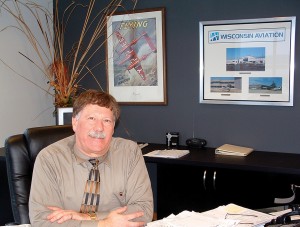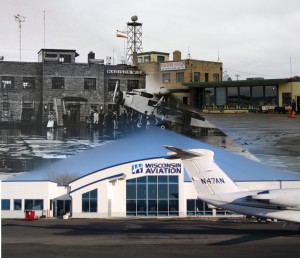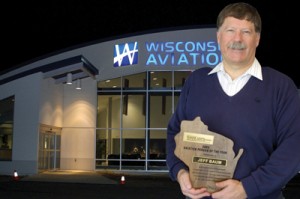By Rose Dorcey
It’s 1981. Interest rates have risen to 21 percent. The U.S. economy has fallen off a cliff. It sounds like the worst possible time to start an aviation business. Nevertheless, that’s exactly what Jeff Baum did. In spite of the dismal conditions at his company’s birth, Wisconsin Aviation has grown to become the state’s largest FBO.

Wisconsin Aviation President Jeff Baum said that CEOs from impressive corporations admire the panoramic airport view from his glass-walled office.
“Defective genes” is how Baum explains his decision to begin an FBO under those circumstances. He graduated from college with an MBA in finance. His work as the assistant to the chancellor at the University of Wisconsin-Whitewater was satisfying. When he received his private pilot certificate after his college graduation, he did so only because he “liked airplanes.” He had no plan to change careers, but he continued to advance his ratings, eventually becoming a flight instructor.
“Working a day job, and flying at night,” is how Baum described his life. Soon, aviation became a bigger part of life. When a business opportunity became available at Watertown Municipal Airport (RYV), Baum jumped in. After quitting his university job, he and business partner Pete Schoeninger, and just one employee, started a fledgling flight school at the sluggish southeast Wisconsin airport.
Today, Wisconsin Aviation employs more than 170 people at three locations. What began as a small flight school has grown into a full service aircraft sales and rental business, along with charter operations, aircraft maintenance services, avionics installation and repair, fuel sales, aircraft interior repair and refurbishment, and even airport management. Over 50 aircraft comprise the Wisconsin Aviation fleet.
“It took a lot of very, very long hours of work. We did the right things, we took care of the customers, they came back, they told other people; one customer at a time, we grew the business,” said Baum.
Baum’s business background kept the company from making “big, financial mistakes.” As he considered his company’s growth, he looked at Watertown’s population of 16,000 to 17,000, and its market potential of about 50,000. He saw the need for company expansion if they were to continue to grow. In 1983, he took over the operations at Dodge County Airport (UNU) in the city of Juneau, Wis., just 17 miles from Watertown.
From the early 1980s and on, growth was steady. In 1987, he added a maintenance shop. In 1994, he purchased Four Lakes Aviation in Madison, Wis. A year later, he acquired the assets of Coldstream Aviation Corporation, also in Madison. By 2001, operations had outgrown the small, decades-old Madison facilities, so Baum invested $2.5 million in a state-of-the-art general aviation terminal located on the east side of Madison’s Dane County Regional Airport (MSN).
Baum will tell you that a factor of his phenomenal success is that he remembers his roots. He started as a pilot. He believes that flight schools are absolutely essential to the health of the industry.
“When company decision makers elect to buy an aircraft, there’s usually someone in the company who is an aviation proponent—someone from a flight school. If we don’t have those people from the flight school promoting aviation, where will we be down the road? We won’t have people buying the gas. One person inside a company with some say can make it happen,” he explained.
Anther factor in the success of Wisconsin Aviation is Baum’s perennially positive outlook. He doesn’t believe there are anti-aviation people. It’s only a question of where they place their priorities, he said. This belief has grown out of his experiences in airport management, at both Dodge County and Watertown. He realizes the balancing act that city managers must play, and the decisions they must make as to where the money is spent. Being in airport management gives Baum the opportunity to see that important airport projects are accomplished. He knows that unless someone from local government is a real aviation proponent, the airport will get lost among other city projects.
While admitting he doesn’t believe there are anti-aviation people, he acknowledges the persistent attitude that flying is a “rich man’s sport” and those with that attitude will ask, why subsidize that? This is where Baum feels it’s up to the entire GA community to do more to educate their fellow citizens on the economic importance of their airports. He sees the economic benefits airports provide to communities on a daily basis.
“When major enhancements were made to the Watertown airport in the 1980s, we told people to watch the mushroom farm—that’s what we called it,” he said. “Businesses sprouted near the airport. We now have eight new restaurants within walking distance.”
He also remembers a Cessna 421 coming to Watertown carrying four company executives. They visited Watertown to consider placing a $1 million order with a local industry. A company policy prohibited making large capital expenditures unless there was an easily accessible airport nearby, because of the need for periodic inspections. The local company got the contract, in part because of Watertown’s airport.
Sometimes, he sees the other side. He has flown company officials over potential development sites for inspections. As Baum watched, they crossed cities off the list because there was no suitable airport within a certain distance.
Baum is optimistic about the future of general aviation, but quick to admit that it can be tough to be in the business of aviation.
“I don’t think most pilots realize how tough the FBOs they visit have it,” he laments. “It’s a very tough business to make money in and a very difficult business to manage. Whether it’s the FAA, or anti-noise people, you name it, it’s challenge after challenge after challenge. We survive on psychic income.”

From meager beginnings to a state-of-the-art terminal on the east side of Dane County Regional Airport, Wisconsin Aviation has become the state’s largest FBO.
Certainly, the “psychic income” he refers to is the people with whom he meets and works. He has flown well-known folks like Barbara Bush, John Kerry, Jon Bon Jovi and Brett Favre. He enjoys the travel, and the variety of aircraft he flies. He might fly a Cessna Citation one day, and a Cessna 172 the next.
“Little airplanes are just as much fun,” he said. “We get spoiled in the high-performance jets.”
He often flies a “little airplane” when picking up his 18-year old daughter, a student at the University of Minnesota, when she comes home for weekend visits. His wife, Krys, is also a pilot. She works fulltime at the Watertown location.
Baum believes that the more people who come to an airport, the better off the airport will be. Wisconsin Aviation participates in several local events to encourage airport use. Elementary and high school students and other groups tour his facilities on a regular basis. A Boy Scout jamboree at the Dodge County airport location attracted over 300 scouts who were completing their aviation merit badges. The Madison Arts Council hosted a black-tie fundraiser in the sparkling Wisconsin Aviation terminal lobby. Baum encourages events like these at all three company locations, because of the goodwill that it earns in the community.

Several state and national aviation organizations have come to recognize Jeff Baum as an influential businessperson. Baum displays the plaque he received when the Wisconsin Airport Management Association named him the 2003 Aviation Person of the Year.
After more than two decades in the business, Baum continues to get satisfaction from the work he does. Industry colleagues appreciate his work, as well. He’s twice received the Wisconsin Aviation Business Person of the Year award. In 2003, the Wisconsin Airport Managers Association named Baum the Wisconsin Aviation Person of the Year. He serves as president of the Wisconsin Aviation Trades Association, on the board of the Wisconsin Business Aircraft Association, and has previously served on the board of directors of the National Air Transportation Association. He recently became a member of the “by invitation only” Priority One Group/Twenty Group, Inc., a national organization dedicated to providing outstanding service to air travelers.
When asked his final thoughts on the “secret” to his success, Baum laughed and said, “I’m too stupid to change and do anything else,” but his laughter changed to seriousness when he summarized his beliefs. He believes in hiring the right people—people who love what they do. He believes in hard work, a basic business background, and the ability to see things from the customer’s perspective—to ask what they need, not what he needs.
“What’s unique about Wisconsin Aviation is that we started at the worst possible time, but we succeeded to become the state’s largest FBO,” he said. “It takes incredibly long hours, 60 to 70 hours a week and more, but after 25 years, I still love to get out of bed and come to work.”
For more information on Wisconsin Aviation, visit [http://www.wisconsinaviation.com].











